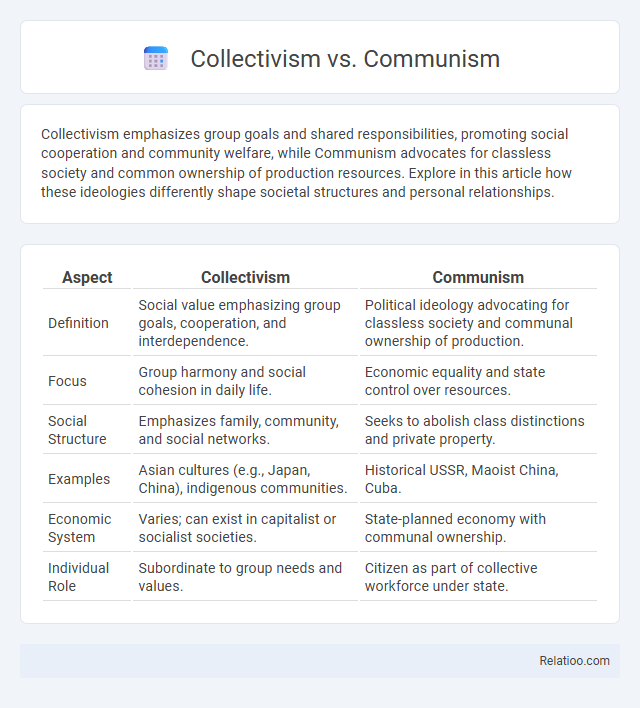Collectivism emphasizes group goals and shared responsibilities, promoting social cooperation and community welfare, while Communism advocates for classless society and common ownership of production resources. Explore in this article how these ideologies differently shape societal structures and personal relationships.
Table of Comparison
| Aspect | Collectivism | Communism |
|---|---|---|
| Definition | Social value emphasizing group goals, cooperation, and interdependence. | Political ideology advocating for classless society and communal ownership of production. |
| Focus | Group harmony and social cohesion in daily life. | Economic equality and state control over resources. |
| Social Structure | Emphasizes family, community, and social networks. | Seeks to abolish class distinctions and private property. |
| Examples | Asian cultures (e.g., Japan, China), indigenous communities. | Historical USSR, Maoist China, Cuba. |
| Economic System | Varies; can exist in capitalist or socialist societies. | State-planned economy with communal ownership. |
| Individual Role | Subordinate to group needs and values. | Citizen as part of collective workforce under state. |
Understanding Collectivism: Core Principles
Understanding collectivism involves recognizing its core principles of prioritizing group goals over individual desires, fostering cooperation, and ensuring shared ownership of resources. Unlike communism, which is a specific political ideology advocating for a classless society and common ownership of production means, collectivism encompasses a broader range of social and economic practices emphasizing collective welfare. Your grasp of these distinctions enhances clarity on how collectivist values influence social structures and policy approaches.
Defining Communism: Key Concepts
Communism is a political and economic ideology aiming to establish a classless, stateless society where property and resources are communally owned, eliminating private ownership to ensure equal distribution of wealth. Key concepts include the abolition of capitalism, the proletariat's control over the means of production, and the ideal of a society free from class distinctions and exploitation. Your understanding of communism should emphasize its theoretical goal of collective ownership and the eventual withering away of the state to achieve true equality.
Historical Origins of Collectivism and Communism
Collectivism traces back to early tribal and communal societies emphasizing group cohesion and shared resources, with philosophical roots in Rousseau's social contract theory. Communism, formalized by Karl Marx and Friedrich Engels in the 19th century, builds on collectivist principles but advocates for a classless society through the abolition of private property and state control of production. The historical origins of collectivism span diverse cultures promoting communal welfare, while communism emerged as a specific ideological response to industrial capitalism and class struggle.
Ideological Differences: Collectivism vs Communism
Collectivism emphasizes the importance of group goals and shared responsibilities, allowing for various forms of social organization and private ownership under common welfare. Communism is a specific political ideology advocating for a classless society with communal ownership of all means of production, aiming to eliminate private property altogether. Your understanding of these distinctions highlights collectivism's broader social cooperation versus communism's focus on revolutionary change towards complete economic equality.
Economic Structures and Resource Allocation
Collectivism emphasizes shared ownership and cooperative management of resources within communities, promoting equitable distribution based on collective decision-making. Communism represents a classless, stateless economic structure where all means of production are owned collectively by the state or community, aiming for equal resource allocation and elimination of private property. In contrast, individualism supports private property and market-driven resource allocation, prioritizing personal ownership and economic freedom over collective control.
Political Systems: Governance and Authority
Collectivism emphasizes group goals and shared ownership, promoting cooperation within communities to achieve common interests. Communism, a specific form of collectivism, advocates for a classless society where the state controls all property and resources to ensure equality. Your understanding of these political systems clarifies how governance and authority vary from decentralized collective decision-making in general collectivism to centralized state control in communism.
Social Impact: Individual Rights vs Collective Good
Communism prioritizes the collective good over individual rights, often resulting in state-controlled resources and limited personal freedoms to achieve social equality. Collectivism emphasizes group goals and social cohesion but can vary in how it balances individual rights, sometimes allowing for more personal autonomy within communal frameworks. You must consider how each system negotiates the tension between individual liberties and social welfare to understand their distinct social impacts.
Notable Examples in World History
Collectivism is a broad social philosophy that emphasizes the group over the individual, with notable examples including the kibbutzim in Israel and various cooperative movements worldwide. Communism, a specific political ideology advocating for a classless society and common ownership of production, is exemplified by the Soviet Union under Lenin and Stalin and Maoist China. Your understanding of these distinctions helps clarify how collectivism can exist within different frameworks, while communism represents a more rigid, state-controlled form of collective organization.
Pros and Cons: Comparing Strengths and Weaknesses
Collectivism emphasizes shared goals and cooperation, fostering social unity but sometimes limiting individual freedoms, while communism seeks to establish a classless society with common ownership, promising equality yet often facing practical challenges like reduced incentives and bureaucratic inefficiencies. Comparing these with individualism, which prioritizes personal autonomy and economic freedom, reveals strengths in innovation and self-expression but potential weaknesses in social inequality and reduced communal support. Understanding your preference depends on balancing collective welfare against personal liberty, as each system offers distinct advantages and drawbacks in social organization and economic management.
Modern Relevance and Future Trends
Collectivism, communism, and socialism each emphasize group welfare but differ in ownership and governance structures, with collectivism promoting shared resources without strict state control, communism advocating for classless, stateless society, and socialism supporting both public ownership and democratic management. Modern relevance shows collectivism influencing cooperative businesses and community-driven initiatives, while communism faces challenges due to historical economic inefficiencies and political authoritarianism, and socialism gains traction through policy reforms in healthcare and education worldwide. Your understanding of these ideologies informs future trends where hybrid models may emerge, combining collective resource management with democratic rights and market economies.

Infographic: Collectivism vs Communism
 relatioo.com
relatioo.com